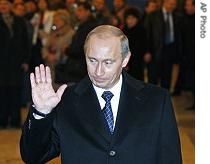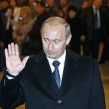
MOSCOW LAMBASTES WEST DURING ELECTION LULL
Publication: Eurasia Daily Monitor Volume: 4 Issue: 228
By:

Russia has slipped into a distinctly anti-climactic mood since the December 2 parliamentary elections delivered exactly the result planned in the Kremlin. In hindsight the massive propaganda campaign appears to be overkill, leaving an aftertaste of Soviet manifestations of “unbreakable unity,” so even the triumphant United Russia, the quasi-party of the state bureaucracy, was ordered by its masters in the presidential administration to cancel the celebratory banquet (Vedomosti, December 3; Ezhednevny zhurnal, December 6). After all the glorification of Vladimir Putin – the “savior of Russia” – and pledges of eternal loyalty, it is unclear how to proceed with electing somebody else to be president with the same amount of authority and responsibility. In this awkward pause, one theme is being exploited to the maximum extent of its political usefulness – Western “hostility and Russia’s readiness to repel its treacherous encroachments and interferences.
This theme acquired new, aggressive overtones in the final week of the election campaign when Putin accused the United States of orchestrating the Organization for Security and Cooperation in Europe’s (OSCE) decision not to send observers from the Office for Democratic Institutions and Human Rights (ODIHR) to monitor the elections due to unacceptable restrictions on their work (Vremya novostei, November 27). A more emotional charge was added when the liberal parties that had no chance of gaining an entry ticket to parliament but dared to criticize the supreme leadership were described as “jackals” and “enemies” working on the instructions of Western embassies against the interests of the state (Gazeta.ru, December 5).
In the aftermath of the “moment of truth” (as Putin defined the voting), this theme gained a peculiar twist as the Kremlin announced that Italian Prime Minister Romano Prodi had congratulated Putin “on the success of the State Duma elections” (the Italian authorities firmly deny that any congratulations were offered) and denied that President George W. Bush had expressed concerns about the irregularities in a telephone conversation with Putin (Nezavisimaya gazeta, December 6). One Western leader who did find it appropriate to congratulate Putin on the “election victory” was French President Nicolas Sarkozy, and the Kremlin found a tactful way to express its gratitude – awarding the French company Renault a lucrative contract for modernizing the giant car producer AvtoVAZ (Kommersant, December 8).
The OSCE, meanwhile, felt the full impact of Russia’s irritation at the annual Ministerial Council, where Moscow emphasized the Organization’s crisis and demanded revisions of its statute and a reduction of its activities in promoting democratic values (Rossiiskaya gazeta, December 1). The crisis is indeed deepening, and the clearest manifestation of that is Russia’s proudly announced decision to suspend its participation in the Conventional Forces in Europe (CFE) Treaty as of December 12, in accordance with legislation that Putin had signed the day before the elections. This unilateral step was at the center of discussions at the Russia-NATO Council last weekend, and that meeting registered such an unprecedented scope of disagreements that the program for cooperation in 2008 was not approved. Foreign Minister Sergei Lavrov put the blame for this failure squarely on Washington, seeking to probe every possible crack in Atlantic solidarity (Nezavisimaya gazeta, December 8). What weakened these accusations was the fact that Chief of the General Staff Yuri Baluyevsky paid a visit to the United States last week and signed a memorandum on bilateral military cooperation (Newsru.com, December 9).
The content of Baluyevsky’s talks with his U.S. counterparts was not revealed, and the success of the two-week joint Russian-U.S. “Torgau-2007” military exercise in Germany had little, if any, coverage in the Russian media (RIA-Novosti, December 4). What was covered at length was the report by the commander of long-range aviation, Pavel Androsov, who took particular pride in the fact that Russian strategic bombers on patrol had been intercepted 70 times by NATO fighters, which he described sometimes as “partners” and sometimes as “potential adversaries” (Nezavisimoe voennoe obozrenie, December 7). Another breaking story was the deployment to the Mediterranean of a group of ships from the Northern Fleet, including Russia’s only aircraft carrier, the Admiral Kuznetsov (Izvestiya, December 6). The strategic value of “showing the flag” is rather questionable, but the Kuznetsov’s long record of technical failures and accidents reveals the high-risks involved in this cruise.
A particular point to this military bragging was added by First Deputy Prime Minister Sergei Ivanov, who made a congratulatory speech for the Military-Industrial Commission and asserted that “nuclear parity” with the United States was necessary to preserve Russia’s independence, since “the weak are not respected” (Gazeta.ru, December 7). In Moscow’s euphoric political atmosphere, such aspirations may look entirely appropriate, but Ivanov should know better, as the Russian strategic arsenal is set to shrink by at least a third in the next five years even without any arms control obligations.
This enthusiastic self-deception is neither innocent nor harmless, and every political point scored in the domestic competition for drawing the toughest line signifies a deduction from the reservoir of trust built together by Russia and the West over the last two decades. The more Moscow insists on its right to say “No” to various international initiatives – from the sanctions against Iran and the trans-Caspian pipeline to Georgia’s accession to NATO and a Kosovo settlement – the more its Western partners see the need to develop a common position to address Russian egocentrism.
There are few reasons to believe that in a few months’ time a new political arrangement will take shape in the Kremlin and Russia will move toward a re-engagement with the West. The problem is not that poisonous propaganda has forced the political elite to unlearn how to think about security in cooperative terms. The greater problem is that this as-yet-unknown arrangement can hardly be stable, and as it starts to unravel the need to mobilize the masses to march under the banner of “putinism” will only increase.




